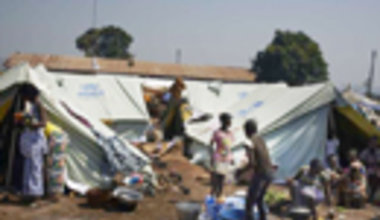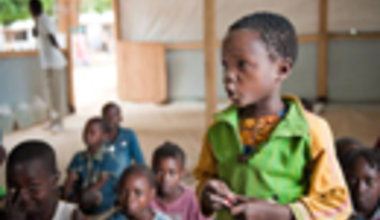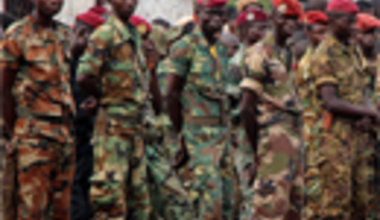UN rights official calls for international efforts to avert disaster
20 December 2013 – The crisis in the Central African Republic (CAR), where thousands of people have been killed and 750,000 others driven from their homes, risks deteriorating even further amid escalating Muslim-Christian clashes and the reported involvement of foreign elements, a top United Nations official warned today, calling for international efforts to help avert disaster.
“These developments are extremely worrying and should ring alarm bells around the world for sustained and urgent efforts to be taken to prevent the [CAR] from plunging into disaster,” UN High Commissioner for Human Rights Navi Pillay said in a statement in Geneva, urging the international community to prioritize the disarmament of all sides and accountability for perpetrators of serious human rights violations.
“Too often in history we have seen the political manipulation of religious and ethnic differences result in horrific violations and long-term damage to the social fabric of a country. I urge leaders at both national and local levels in the Central African Republic to stop stoking violence on the basis of religion,” she added, citing a litany of rights abuses including killing, sexual violence, arbitrary detention, attacks on hospitals, intimidation and destruction of property.
CAR has been thrown into turmoil since Séléka rebels launched attacks a year ago and forced President François Bozizé to flee in March. A transitional government has since been entrusted with restoring peace and paving the way for democratic elections, but armed clashes have erupted again and the mainly Christian anti-Balaka movement has taken up arms.
Over the past two weeks Christians and Muslims have launched reprisal attacks against each other in and around Bangui, the capital, where some 210,000 people have been driven from their homes. Nearly 750,000 people have been displaced overall out of a total population of 4.6 million, 40,000 of them fleeing to neighbouring countries, according to the UN refugee agency (UNHCR).
A UN human rights team has received reports of ongoing abuses by both anti-Balaka groups and ex-Séléka forces in various parts of the country. “In Bangui, individuals who had fled from their homes do not want to return for fear of imminent attacks by anti-Balaka groups, which, according to reports, appear to be getting more heavily armed and organised by the day,” Ms. Pillay said.
“In the west of the country, in Bouar, our team witnessed clear attempts to foment fear and distrust among religious communities, and the reported involvement of armed elements from neighbouring countries. We have also received reports that ex- Séléka forces have been distributing weapons to the Muslim civilian population.”
Other incidents cited included the reported lynching of at least 12 Muslims in Bangui in the past 10 days, reprisals by anti-Balaka groups in Bouar where at least 18 civilians had been massacred by ex- Séléka forces two months ago, and reports of numerous deaths in attacks, reprisals and counter-reprisals in Bohong, 75 kilometres from Bouar.
But Ms. Pillay also noted the “laudable efforts” by Archbishop Dieudonne Nzapalainga, Pastor Nicolas Guerékoyamé and Imam Omar Kobina Layama to foster inter-religious peace.
“The Archbishop, the Pastor and the Imam have been showing important leadership at a time when it is so badly needed by their followers, and they have managed, with some success, to defuse tensions between communities,” she said.
“We have seen young Muslims take it upon themselves to protect churches, and churches are serving as safe havens for internally displaced people, regardless of their religious backgrounds. Such developments are extremely encouraging and I call on all religious and community leaders to redouble their efforts to ensure that entire communities are not vilified in the dangerous cycle of violence and reprisals that we have been witnessing.”
Christian and Muslim leaders in other towns, including Bouar, have also held joint meetings and are working together to spread messages of tolerance to the civilian population.
The UN Children’s Fund (UNICEF) reported that children were being targeted in the violence. The agency also feared a looming nutritional crisis, spokesperson Patrick McCormick told a news briefing in Geneva.
The UN World Food Programme (WFP) has been scaling up to reach more than 1 million people in 2014 in the face of huge challenges and the dangers to staff on the ground. WFP is distributing food wherever it can, including hospitals, orphanages, churches and mosques, spokesperson Elisabeth Byrs told the briefing, noting that with its partners it has distributed nearly 506 tons including rice, split peas and oil to over 118,000 people in Bangui so far in December.
UN World Health Organization (WHO) spokesperson Tarik Jasarevic said hospitals continued to be targeted by unidentified armed groups. A hospital in Begua, on the outskirts of Bangui, was looted earlier this week by unknown militias. Shooting continues in Bangui, making visits by WHO teams to hospitals and medical centres much more difficult, he added.
Source: UN News Centre
 UN
UN





